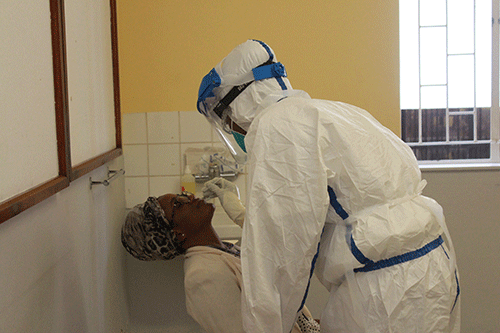Tomorrow will officially mark a year since Namibia recorded its first ever Covid-19 case. Ironically, yesterday also marked one year since the World Health Organisation officially declared the spread of the novel coronavirus a pandemic.
The virulent pandemic has now claimed over 2.6 million lives around the world, including 450 deaths locally.
A year ago since a Romanian couple tested positive for the virus in Windhoek, triggering the start of a nationwide lockdown, life has largely returned to normal for many Namibians. However, the economic devastation resulting from the pandemic is far from over despite the development of Covid-19 vaccines offering a glimmer of hope.
Namibia had immediately declared the virus an outbreak a day after laboratory results confirmed the first two positive cases in the country.
The Romanian couple arrived in Windhoek from Spain via Doha, Qatar, on 11 March 2020. They had been screened on arrival at Hosea Kutako International Airport but showed no symptoms at that time. The couple presented to a private health facility with flu-like symptoms in Klein Windhoek and were referred for testing.
At that time, Namibia could not test for Covid-19 and had to send samples to South Africa for processing. The couple’s results came back on 14 March and were announced for the first time by the minister of health Dr Kalumbi Shangula. They recovered 79 days after their initial diagnosis.
Days after the two confirmed cases, President Hage Geingob on 17 March 2020 declared a state of emergency and introduced measures including the closure of all entry points, the suspension of mass gatherings to control the further spread of the virus which later led to the mandatory wearing of masks, sanitising and maintaining social distance. But the disease spread further across the country, with Erongo region becoming the initial hotspot.
On 10 July, the first death was reported. “A 45-year-old man from Walvis Bay, Erongo region, presented to a health facility on 5 July with complaints of dizziness, cough and difficulty in breathing. His condition deteriorated quickly and he died on 8 July 2020 after a positive confirmatory result of Covid-19,” announced Shangula.
As things stand, the country now has 2 069 active cases and 450 confirmed deaths while the cumulative cases have exponentially grown to 40 631. Now a year on into the pandemic, all hopes are pinned on the recently approved vaccines. Despite many countries taking delivery of the vaccines, Namibia is yet to receive a single dose. Vaccine doses are only expected in the country later this month.
‘Impressive’
Centres for Disease Control and Prevention Namibia country director Dr Eric Dziuban said the development of the vaccines in a record time has been impressive. “The challenge remains to ensure that the vaccines are available to countries across the world.
“Nobody is safe until everybody is safe and the US government is committed to a multilateral response to address the global need for the Covid-19 vaccines. The United States will work with our partners across the globe to increase access to the Covid-19 vaccine, including here in Namibia,” Dziuban told New Era.
“Covid-19 was a new virus to affect the world, but the vaccines that have been developed have used established science. The world has also worked together sharing knowledge and resources. This is an incredible achievement.
“It is wonderful that vaccines were able to be developed within a year of this virus’s arrival, without skipping any of the important steps for making them safe and effective.”
In addition, Dziuban said, the pandemic has brought forward a lot of worries, fears, and misinformation. “CDC makes recommendations based on science. We know so much more, one year later, than we did at the start of the pandemic and this means we can refine, adapt, and strengthen our response,” he added.
“We continue with what is working well, and we try new options for where we still need to succeed. One of the things that has not changed through this pandemic has been the importance of handwashing, wearing a mask, and physical distancing. These measures are something we can all immediately implement as individual actions towards ending this pandemic.”
Survivors share experience
Meanwhile, some Covid-19 survivors have graciously shared their stories, including the experience on how they dealt with stigma.
“Someone at work found out I had the virus and it went viral at work. There is something called victimisation, wherever some of my friends meet, they would be victimised and people would think they had Covid-19 because they were with me,” said Elizabeth Amutenya from Windhoek.
She said Covid-19 is real and people need to be extra careful when getting the results as there seems to be a lot of panic and anxiety.
“The issue is people panic. Once they are told they have the virus, they start thinking too much which leads to stress. They don’t do counselling when they are telling people’s results and sometimes people are caught off guard and maybe that is how some end up in hospitals due to overthinking. You have to mentally prepare yourself,” she added.
One of the recent survivors Collin April from Walvis Bay said he was bedridden for over two weeks while battling Covid-19. “The pandemic is real. I was in bed for two and a half weeks. Having the disease feels like death while you are alive. I had a lot of chest pains which made me have difficulty is breathing.
“I would change my T-shirts five times a day because I couldn’t stand the heat, I would open my garage door for ventilation at 03:00,” recalled April.
The well-known football agent and coastal entrepreneur said one year after Covid-19, it seems people are not taking the disease seriously. “For those who don’t have it, please take care of yourself, maintain social distance, sanitise, wash your hands and always wear a mask. The moment you start feeling unusual, visit the nearest doctor and have yourself checked,” cautioned the 46-year-old.
– psiririka@nepc.com.na


